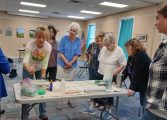By Page H. Gifford
Correspondent
Renowned New York City-based drummer, composer, and jazz musician Graham Doby and his quartet will perform on Nov. 18, at 7 p.m at the Carysbrook Performing Arts Center. His sound has been described as “tremendously agile” with poly-rhythmic jazz fluidity grounded in funk and rock four-on-the-floor groove sensibility. A drummer for over 20 years, Doby has cultivated his own diverse community, sharing unique talents and styles.
Doby discovered his love of jazz when he was 12 years old. In sixth grade, he auditioned for the jazz band at school but wasn’t accepted. He didn’t let that deter him and took the challenge to make it the following year.
“Throughout that year my dad played jazz recordings consistently around the house, this is where my love for jazz took hold. I became very interested in learning the style and started lessons with Robert Jospé.”
At the beginning of high school, he began playing gigs and says he was lucky to have a high school music teacher, Greg Thomas, who instilled in him the foundation for being a professional musician.
“Another mentor was John D’earth. John and I played duo in his studio, and this is where the conceptual element in my playing began to solidify,” he said. “I also remember seeing D.J Harrison play his first gig with John at Fellini’s. I was blown away by his approach to the drums and I continued to watch him play at Miller’s almost every Thursday. That’s where my journey began.”
He says his two biggest influences in the jazz genre are Elvin Jones and Tony Williams.
“Elvin Jones’ phrasing and intense, polyrhythmic, full sound have always resonated very deeply with me,” he said. “It’s so easy for that style of playing to overpower the other instruments, and for it to not sound musical, but Elvin always finds a way to balance the melodic element of drumming with an intense pedagogy of playing.”
Improvisation is something unique to jazz music, separating jazz artist’s unique sounds. Doby says he has a two-step approach to treating improvisation.
“The first and most obvious is practice. I’ve spent well over the proverbial 10,000 hours practicing, developing the focus and drive to spend hour upon hour honing my craft. This includes listening, transcribing, and practicing rudiments to be able to flow around the kit (drum set) easily,” he said. “The next step is a bit more conceptual. John D’earth once told me, “Don’t worry about what you just played because it’s too late to do anything about it.”
His technical approach also has a philosophical meaning; a meaning familiar to many artists, whether they are musicians, visual artists, actors, or writers. They immerse themselves in their work or performance by giving their passion and soul to it.
“The evolution of this approach is a philosophy of always living in the moment and understanding that one’s playing is an extension of themselves. This takes many years to be comfortable with and more so, is a never-ending process. The idea is that at any moment, you can tap into your foundation of playing and never think about what you are doing. It’s simply an expression of who you are at that moment in time. I don’t look at the drumsticks as sticks, or the bass drum or the pedals as pedals, but more as extensions of my hands, my feet, and my mind. This can be scary at first because you truly are letting go.”
Much of allowing himself to become part of the music is evident when you hear it. Reminiscent of Chick Corea and Chuck Mangione, Doby takes the listener on an unexpected journey through sounds that are mellow and contemporary. If his sounds were colors it would be on a spectrum between deep turquoise blue and hot chili pepper red.
“Dr. Cornel West says it perfectly: “That’s what greatness is, it’s the courage to go to the edge of life’s abyss, to step out on nothing, and still think you’re going to land on something.” When I practice now, I am mainly running calisthenics such as rudiments and technique work, and then move to experimenting with different conceptual approaches to the drums.”
Doby’s favorite jazz standard to perform was a difficult choice because he says there are so many great standards but says his favorites are other musicians’ originals.
“When I play others’ songs, I get to interpret what someone else wants and how to express that on the drum set, which is always a fun challenge and creative oasis for me.” He said that if he had to pick a standard, he would pick Actual Proof by Herbie Hancock.
“I like playing Actual Proof because it’s a perfect balance between jazz and funk, so you can stretch into different genres throughout soloing. It also has a difficult form and different time signatures which makes you stay on your toes.”
Doby discusses the balance between preserving traditional jazz with incorporating new and innovative elements into the music. He believes, like many musicians, it is imperative to respect and honor the history of this treasured music. He understands that the study of traditional jazz music is to have a foundation to build upon.
“You can further experiment–not to would be insulting and devoid of substance. I also believe that if the jazz legends no longer with us were still around today, they would be disappointed in how jazz has been so codified. Jazz is a music of innovation and in my opinion, simply regurgitating the vocabulary of the past does not move the genre forward. It holds it in the same space, which is the antithesis of what jazz is,” he said. “There are some great artists out there today who are playing eclectic and relevant jazz with the incorporation of other genres and I think this is how the music stays innovative and fresh.”
Doby said that there are musicians he is currently listening to outside of the jazz genre that inspire him and thinks most jazz musicians are listening to many genres. He believes that it is essential to listen to different genres to make the music eclectic.
Staying motivated and inspired for an experienced musician can be challenging. He answers this with a view on the current music industry.
“One of the main challenges of being a jazz musician, and a musician in general, is making a sustainable livelihood in the current state of the music industry. With streaming becoming the main source of music consumption, it has become nearly impossible to make a living as a musician,” he said. “Staying motivated is another challenge. Some days you ask yourself, “What’s the point?” You work so hard for so many years only to barely be able to make ends meet. The internal way I overcome this uphill battle is simply through the love of music. Tapping into that source inside is what keeps me coming back.”
He said he has been able to mitigate and navigate these challenges by creating a community with fellow musicians outside of the traditional music industry, sharing systems of resources, and cross-network. “I feel lucky to be surrounded by so many talented friends and colleagues who I know have my back and keep pushing me when the logistics of this work make it hard to keep the energy alive in the music.”
For more information and tickets, visit www.carysbrook.org.




